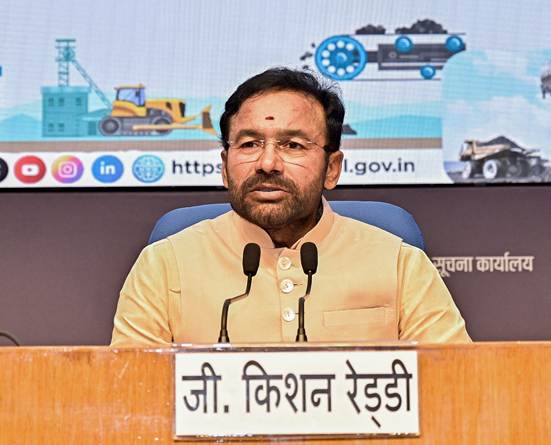New Delhi, February 7, 2025 : Reducing Coal Imports and Increasing Domestic Production is the focus of the Coal Ministry, said Union Minister of Coal and Mines, Shri G Kishan Reddy. Addressing a press conference in New Delhi today, minister said that coal ministry is progressing in the path of achieving ‘Atmanirbharta’ in the sector. Secretary, Ministry of Coal, Shri Vikram Dev Dutt, Director General, PIB Shri B Narayanan, Additional Secretary, Ministry of Coal Smt Vismita Tej and Joint Secretary, Ministry of Coal Shri Sanjiv Kumar Kassi were also present at the Press Conference.
The coal sector remains a cornerstone of India’s energy security, playing a vital role in the country’s industrial and economic growth. With the fifth-largest geological coal reserves globally and as the second-largest consumer, coal continues to be an indispensable energy source, contributing to 55% of the national energy mix. Approximately 74% of power generation in India relies on Thermal Power Plants (TPPs), reaffirming the need for a robust and sustainable coal sector, said the Minister. Addressing the media, minister highlighted the progress made by the Ministry.
Reducing Imports and Strengthening Domestic Production
Coal Ministries efforts has significantly reduced reliance on imported coal. Between April and November 2024, coal imports declined by 5.35%, saving approximately $3.91 billion (₹30,007.26 crore). Notably, coal imports for domestic power plant blending fell by 23.56%.
The Ministry’s ‘Mission Coking Coal’ aims to increase domestic coking coal production to 140 MT by FY 2029-30, thereby reducing dependency on imports in the steel sector.
Record-Breaking Production and Policy Reforms
India’s coal production has reached an all-time high of 997.82 million tonnes (MT) in FY 2023-24, marking a significant rise from 609.18 MT in FY 2014-15, with a Compound Annual Growth Rate (CAGR) of 5.64% over the past decade. In FY 2023-24 alone, production has surged by 11.71% compared to the previous year.
A landmark policy reform came with the introduction of commercial coal mine auctions in 2020, encouraging private sector participation and modern technological adoption. As of January 2025, the Ministry of Coal has allotted 184 mines, with 65 blocks receiving Mine Opening Permissions. Total production from these blocks has reached 136.59 MT, registering a 34.20% year-on-year increase. This is expected to exceed 170 MT target in FY 2024-25.
Coal Sector’s Contribution and Growth
Among the eight core industries, coal has exhibited the highest growth rate, recording a 5.3% increase in December 2024 compared to the previous year. Additionally, the coal sector accounts for about 50% of freight revenue for Indian Railways and provides direct employment to nearly 4.78 lakh individuals.
State Governments also benefit significantly from coal revenues, with royalty, District Mineral Foundation (DMF) contributions, and State GST collections amounting to ₹31,281.7 crore in the fiscal year 2023-24.
Sustainability and Diversification Efforts
The coal sector is embracing sustainability with large-scale afforestation efforts, with over 54.06 lakh saplings planted across 2,372 hectares in 2024. Under the ‘Ek Ped Maa Ke Naam’ campaign, over 1 million saplings were planted at 332 locations in 11 states.
Additionally, 4,695 hectares of land have been identified for Accredited Compensatory Afforestation, and a total of 18,513 LKL of treated mine water has been provided to over 18.63 lakh people across 1,055 villages over the past five years.
Commitment to Responsible Growth
The coal sector’s transformation is marked by policy-driven reforms, sustainable initiatives, and technological advancements, ensuring energy security while prioritizing environmental responsibility. Through these efforts, India is paving the way for a resilient, self-sufficient, and sustainable future in coal production and energy supply.
The Ministry of Coal is committed to ensuring a robust, efficient, and sustainable coal sector that supports India’s economic growth and energy security. Through policy reforms, production enhancements, and environmental initiatives, the Ministry continues to drive progress towards a self-reliant coal industry.

